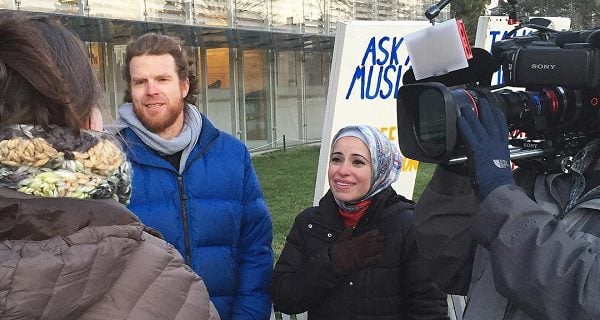
Americans of All Stripes Emerge to Fight #MuslimBan
Something interesting happened in the wake of President Trump’s first attempt at fulfilling a campaign promise, this one having to do with keeping Muslims out of the country “until we figure out what the hell is going on.” In the wake of what came to be known as the #MuslimBan, where visitors from six Muslim-majority countries were prevented entry into the U.S. even if they had valid visas, something amazing happened: Thousands of ordinary Americans swarmed dozens of airports around the US to advocate for some of the most vulnerable Muslims in the world. In addition, lawyers and legal groups such as the ACLU and CAIR positioned themselves to give legal aid to immigrants as well as provide much of the legal backbone for federal court pushbacks against the executive orders behind the bans. While some of this support was driven by antipathy toward Trump and the birth of the #resist movement, much of it was driven by the idea that the rule of law should protect those individuals most in need of it, and that Muslims would not be an exception under the Trump administration. “These are not the American values that we all know and love,” said Afnan Mossaad, a native of Texas whose parents are from Egypt. “When there’s injustice, you’ve got to stand up for what’s right.”
Muslim Women Become Mainstream Icons
Ibtihaj Muhammad is being made into a female superhero Barbie doll, Women’s March co-organizer Linda Sarsour was honored on the cover of Vanity Fair magazine and an amazing representational group of women, including one in a flag hijab based off a photograph by Ridwan Adhami, were turned into iconic posters. This was the year that several Muslim women became mainstream icons for their resistance work, community organizing and tremendous athletic skills, among other work. Model Halima Aden graced the cover of Allure magazine in July, wearing her headscarf as part of her ensemble and catapulting her into the upper echelons of modeling, while poet Mona Haydar cut her first two music-rap videos — “Wrap My Hijab” and “Dog,” the latter of which called out celebrity shaikh culture before the Nouman Ali Scandal became public news — to critical acclaim from Muslim and non-Muslim artists. Indeed, Muslim women in a variety of industries became household names in 2017.
Muslims in Hollywood Make Their Mark
Hollywood, like other segments of American society, has responded to the marginalization of Muslims in the wake of President Trump by creating spaces for talented Muslims to join its ranks. And that talent found it’s spotlight this year. Riz Ahmed, the erstwhile MC and rapper who has found critical acclaim in various performances including last year’s “Rogue One,” won an Emmy for his powerful performance in HBO’s “The Night Of.” Also this year, Mahershala Ali won an Oscar for his performance in best picture-winner “Moonlight.” Several other Muslim actors, including Omar Metwally, Mouzam Makkar, Yasmine Al-Massri, Zainabo Johnson and Adeel Akhtar, among others, found work in new shows and pilots this year as well. Also Hasan Minhaj of “The Daily Show” released his Netflix special “Homecoming King” to critical acclaim. Two major releases this year – Kumali Nanjiani’s “The Big Sick” and Aziz Ansari’s second season of “Master of None” deserve mention for their humanizing portrayals of Muslim (albeit secular Muslim) life in America.
Next: The Ballot, Rebuilding a Jewish Cemetery and the Mainstream fight against anti-Muslim bias












